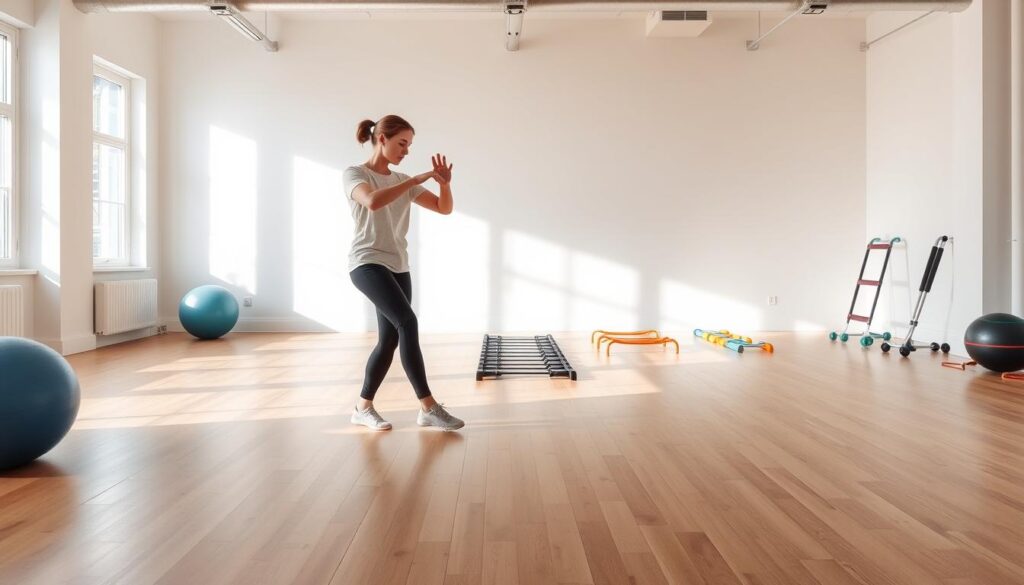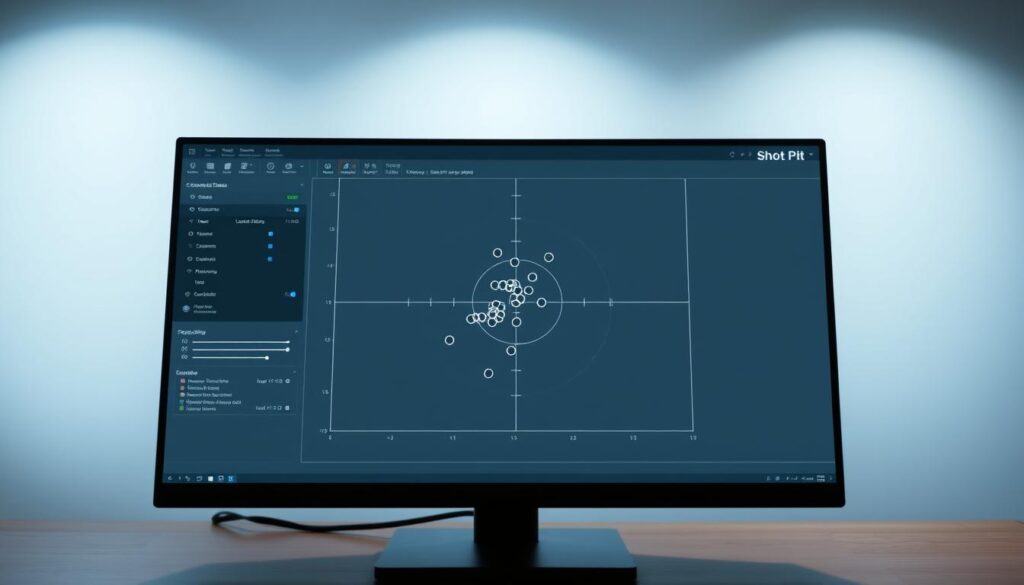Anúncios
Ever wondered why left-handed shooters find it hard to find the right aim training? Knowing your hand and eye dominance is key to better left-handed shooting. It’s not just about practicing; it’s about using the right techniques for left-handers.
In this section, we’ll look at the top five aim exercises to boost coordination and shooting skills. These exercises help align the eye, sight, and target perfectly. Join us as we explore left-handed marksmanship and see how aim exercises can improve your shooting.
Anúncios
Understanding Left-Handed Shooting Techniques
Left-handed shooting techniques need a special approach to improve accuracy. Proper sight alignment is key, ensuring the shooter’s eye, rear sight, and front sight are correctly positioned. For left-handers, this means aligning sights from the left side.
The top of the front sight should match the top of the rear sight. This ensures equal spacing on both sides. This careful alignment is vital for consistent and accurate shots.
Anúncios
Grip and trigger control are crucial for left-handed shooters. The trigger finger should rest on the trigger, applying steady pressure. This helps maintain aim without disruption.
Mastering this technique is essential for good results during aim training. Controlling breathing is also important to avoid movement during the shot. Shooters can hold their breath after exhaling or pause before squeezing the trigger for rapid fire.
The Importance of Stance in Shooting
A good shooting stance is key for left-handed shooters. It helps keep your aim steady, improving control and accuracy. Start by standing with your left foot 4 inches behind your right, keeping your feet shoulder-width apart. This stance helps distribute your weight evenly, making you more stable.
It’s important to align your body correctly. Make sure your hips and shoulders are facing the target. A natural stance helps you stay relaxed, making it easier to aim.
Finding your natural point of aim (NPA) is vital for accurate shots. To find it, stand in your shooting stance with your eyes closed for a few deep breaths. Then, open your eyes and see where the sights naturally point. If they’re not on target, adjust your stance without straining.
Adjustments to your NPA depend on the shooting position:
- Standing Position: Rotate your body around an imaginary point between your feet for horizontal alignment. For elevation, shift your non-shooting hand on the forearm or adjust foot placement.
- Kneeling Position: Pivot around your rear foot for horizontal adjustments, and for elevation, tighten or loosen your sling as needed.
- Sitting Position: Change horizontal alignment by adjusting your legs and hips. Elevation can be modified by changing sling tension or adjusting your non-shooting arm on your leg.
These small stance adjustments are crucial. They help align your rifle and body with the target. This reduces the need for muscle tension, which is key for accurate aiming.
Aim Training Exercises for Left-Handers
Aiming exercises are key for left-handed shooters to get better at precision and accuracy. They help improve grip, stance, and trigger control. Steady hold exercises and dry firing are especially important for skill growth.
Steady Hold and Holding Exercises
Steady hold exercises help left-handed shooters keep their aim steady. The Single-Leg Stability Stand is a great drill. It makes you balance on one leg while holding the gun.
This drill strengthens your core and legs, helping you stay balanced. The Half-Squat Wall Slide is another good drill. It works your legs and core, helping you stay steady while shooting.
The Guided Pattern drill helps you move smoothly and follow a path on a target. It builds muscle memory for precise adjustments. These exercises are key for left-handed shooters to get better at aiming.
Dry Firing Techniques for Skill Enhancement
Dry firing is great for left-handed shooters to work on their trigger control. A good technique is to place your middle finger on the trigger and pull it straight back. Aim at a blank wall to keep your sights steady.
The goal is to press the trigger smoothly without moving your aim. This helps you develop a controlled trigger squeeze. The Visual Trigger Break and Reset Drill is also helpful. It lets you practice feeling when the trigger breaks.
It’s important to keep your finger placement right and press the trigger slowly. This helps you avoid jerky movements. Dry firing is essential for improving your aim and shooting skills.
Incorporating Physical Exercises for Better Coordination
Adding physical exercises to your shooting practice is key, especially for left-handed shooters. These exercises focus on strengthening the shoulders, arms, forearms, and grip. This helps improve your shooting accuracy and stability.
Having a stronger grip and forearm is crucial. It helps control the firearm better and prevents issues like “limp wrist” malfunctions. These malfunctions can cause jams and misfires.
Using Dumbbells to Mimic Firearm Grip
Using dumbbells to mimic a firearm grip is an effective method. This exercise helps you practice holding a weight while aiming at a spot. It mirrors the action of aiming a weapon.
Wrist curls, wrist extensions, and reverse arm curls with a thick bar can boost grip strength. Exercises like ulnar and radial deviation also strengthen the wrist and forearm. This helps manage recoil better.
A firmer grip is key for shooting accuracy. It improves control during recoil and keeps focus on the front sight. Stronger grip strength also means less fatigue during long shooting sessions.
For left-handed shooters, targeted grip training is crucial. Tools like Captains of Crush grippers can help build hand strength. They offer different resistance levels.
The following table shows exercises and their benefits for grip strength:
| Exercise | Target Area | Benefits |
|---|---|---|
| Wrist Curls | Forearms | Improves grip strength for better firearm control |
| Wrist Extensions | Forearms | Enhances wrist stability, reducing malfunctions |
| Reverse Arm Curls | Arms | Strengthens overall arm stability, aiding recoil management |
| Ulnar and Radial Deviation | Forearms/Wrists | Boosts wrist strength for better shooting performance |
Building grip strength through these exercises is vital for left-handed shooters. A balanced approach ensures optimal performance. It prevents overtraining and leads to a more precise shooting experience.

Visualizing Scoped Precision
The mental side of shooting is key, especially for left-handed shooters. Visualization is a powerful tool. It lets them mentally practice their shooting steps. They imagine everything from gripping the gun to aligning the sights.
This mental practice boosts confidence and lowers anxiety. It’s especially helpful for those facing challenges with equipment.
Effective visualization helps left-handed shooters see their shots’ paths. This makes them feel more in control. With regular practice, they get better at focusing and shooting accurately.
Adding concentration exercises like controlled breathing helps too. These practices sharpen focus and mental stability. They build the resilience needed for precision training.
For left-handed shooters, mastering visualization is crucial. Setting clear goals and practicing regularly builds a mental success framework. This approach improves shooting skills and helps overcome unique challenges.
For more tips on aim exercises, check out resources for left-handed shooters. Garo Games offers data-backed content to enhance visualized aiming techniques.
Analyzing Your Aim Through Shot Plots
Shot plot analysis is key for checking how well you shoot. It helps left-handed shooters see where their shots hit compared to their aim points. By keeping track of this, they can spot patterns and know what to work on.
To set up a shot plot, mark each shot on a target. You can use brass casings or special markers for this. This way, you can see how well you’re doing over time. It shows where you’re making the same mistakes, helping you improve your aim.
| Shot Position | Expected Aim Point | Actual Impact Location | Error Analysis |
|---|---|---|---|
| 1 | Center | 3 inches left | Adjust aim slightly right |
| 2 | Center | 4 inches low | Increase elevation on sight |
| 3 | Center | 2 inches above | Consider grip pressure adjustment |
Using shot plot analysis in your training helps left-handed shooters get better. It’s about tracking and understanding each shot. This makes your shooting skills grow and boosts your confidence.

Building Muscle Memory with Repetitions
Muscle memory training is key for shooters, especially left-handed ones. Doing the same shooting moves over and over helps left-handed shooters get better. This makes them perform well in real shooting situations.
Practicing shooting again and again not only builds muscle memory. It also makes sure shooters use the right techniques. Every practice session helps them get better at shooting. With time, they can shoot well without thinking too much about it.
This method does more than just help with aim. It also helps shooters understand their body’s role in shooting. When they rely on muscle memory, they can focus more on things like the environment and moving targets.
| Factor | Impact of Repetitions |
|---|---|
| Muscle Memory | Improved retention of shooting techniques |
| Aim Consistency | Increased accuracy under varied conditions |
| Mental Focus | Less cognitive load during shoots |
| Physical Coordination | Enhanced left-handed skills and timing |
Left-handed shooters can shoot more accurately by practicing regularly. The quality of their practice and their dedication are crucial. They need to keep working on their shooting skills to get better.
Conclusion
In this left-handed aim training summary, we’ve explored key techniques and methods for left-handed shooters. We’ve seen how the right stance and shooting methods are crucial. These tailored practices can greatly improve your shooting skills.
Steady holds, dry firing, physical conditioning, and visualization are all important. They help create a solid training plan. This plan aims to boost your precision and accuracy.
Muscle memory is vital in aim training. Regular practice makes your skills stronger. This makes it easier to hit your target, even when it matters most.
By adding these specialized practices to your routine, you’ll get better at left-handed shooting. Try out the techniques and exercises we’ve shared. Also, take time to review your performance to reach your full potential as a marksman.





